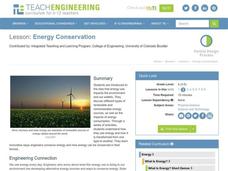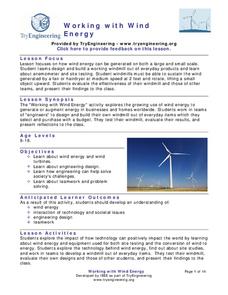Curated OER
Aquaculture: Down on the Salmon Farm
Students examine the problems of the continued development of aquaculture. They also brainstorm ideas that people in this field would need to be successful.
Curated OER
Sink or Float
Second graders explore floating and sinking and make predictions about whether certain objects are likely to sink or float. They read the story Who Sank the Boat? by Pamela Allen. Pupils loacate rhyming words and discuss the events of...
Curated OER
Twirly Whirly Milk
Student observe the effect soap (or detergent) has on the movement of food color in milk. Pupils observe the properties of solids and liquids while making butter. They read a poem, Shaking, and listen for ryhming words. Studdents...
Curated OER
Ecosystem Lesson Plan: Food Chain/Food Web
Students discuss ecosystems, eliciting their current knowledge of an ecosystem. Students receive an Ecosystems document and look at the picture. Students brainstorm connection between the cover picture and ecosystems. The indicated...
Curated OER
Book: The Northern Colonies: Quest for Freedom
Students, after reading Chapter 1 in the book, "The Northern Colonies: Quest for Freedom," assess the diseases that killed Native Americans as well as the causes for the spread of disease during this time period. They contemplate medical...
Curated OER
Climate Change in My City
Young scholars investigate the climate changes occurring locally, regionally and globally over the last one hundred years. They brainstorm and predict whether the current year's weather was warmer or colder than last year then check the...
Curated OER
Erase Threats to Endangered Animals
Students research endangered animals, identify threats to their survival, and brainstorm ways to erase those threats. They use measuring skills and problem-solving strategies to create and bind informational books.
Curated OER
Branches of Earth Science
Connect earth science to science occupations and real-life events with this learning exercise and activity. After listing the 4 branches of earth science, learners spend some time brainstorming two activities each type of earth scientist...
Curated OER
Energy Conservation
Students investigate energy conservation. In this energy conservation and analyzing data lesson plan, students identify and explain several energy sources and research renewable and nonrenewable energy sources. Students use statistics...
Teach Engineering
Energy Resources and Systems
We've talked a lot about energy, but where does energy come from? Pupils brainstorm different energy sources through a class discussion to kick off the 14th installment of a 25-part Energy Systems and Solutions unit. They then research...
TryEngineering
Exploring at the Nanoscale
Discover a world too small to see. In the lesson, young scientists learn about nanotechnology and brainstorm ideas for new applications of it. They perform an activity to determine how surface area changes when objects are made smaller...
Curated OER
Changing Seasons
Explore expository writing and using precise language in this descriptive paragraph writing lesson plan. Learners brainstorm prior knowledge about the changing seasons in Ohio. They describe seasonal items, view seasonal pictures from...
Curated OER
Introduction to Sculpture
Here is a series of questions intended to get kids thinking about what they need, what they have, what they like, and how the overall environment is changed when art is added. They consider the impact of sculptural art in their community...
National Wildlife Federation
Plastic in the Sea
How much plastic do people use? Class members identify how plastic is involved in their daily lives by looking at food packaging either at a grocery store or at home. Learners view statistics for the amount of plastics found on a beach...
BioEd Online
Skeletal Structures
What better way to study the structures of organisms than by creating a new being? After considering different types of skeletal supports (exoskeleton and endoskeleton), budding biogeneticists work together to create their own animals -...
Earth Day Network
Conserving Water Through Art!
Having fresh, clean drinking water is a privilege many people take for granted. Help raise awareness about the scarcity of water and the importance of conservation by discussing different ways water is used in everyday life. Brainstorm...
Consortium for Ocean Science Exploration and Engagement (COSEE)
One Ocean: It Matters!
Here is the first of four poignant lessons on how humans and oceans interact, even if people live far from the coast. This particular lesson also examines studies that are taking place in Antarctica of how climate change is affecting the...
Carnegie Mellon University
Ocean Acidification
After brainstorming what they know about ocean acidification, youngsters place eggs in acid to determine the effects on calcium-containing organisms, and add carbon dioxide to solutions with sea shell material to discover the impact on pH.
Institute of Electrical and Electronics Engineers
Working with Wind Energy
After reading about how wind turbines work to collect clean energy, groups brainstorm and design their own windmill. Within the provided financial and physical constraints, groups must build a working windmill using only the materials...
Smarter Balanced
Food Waste and Food Access
Forty percent of food in the US goes uneaten while 14.5 percent of US households lack a secure supply of food. As part of the preparation for a performance task assessment, groups consider statistics such as these about food waste and...
Polar Bears International
Taking Action!
Motivate young scientists to stand up and take action with this environmental science instructional activity. To begin, the class works in small groups brainstorming actions that support the conservation of the earth before creating and...
NASA
Suit Yourself: Fitted for Space
If he keeps this up, will he have enough air? After watching a video about spacewalks, groups of four brainstorm aspects of spacesuit design and present it to the rest of the class. Groups create mathematical models of oxygen use for two...
It's About Time
Color Reactions that Involve the Transfer of Electrons
Demonstrate the aging of materials as you assist the class in creating rust. Individuals demonstrate oxidation-reduction reactions that result in the rusting of materials, differentiate between materials that will and will not rust, and...
Teach Engineering
Thinking Green!
Encourage your class to solve local environmental issues. Groups brainstorm environmental issues that are affecting the community, choose one they want to solve, and design a product or service to solve their chosen issue. They then...
Other popular searches
- Brainstorming Questions
- Brainstorming for Writing
- Writing Brainstorming
- Brainstorming Topics
- Brainstorming Ideas
- Brainstorming Methods
- Carousel Brainstorm
- Case Study on Brainstorming
- Brainstorming Map
- Concept of Brainstorming
- Brainstorming and Science
- Brainstorming Process

























